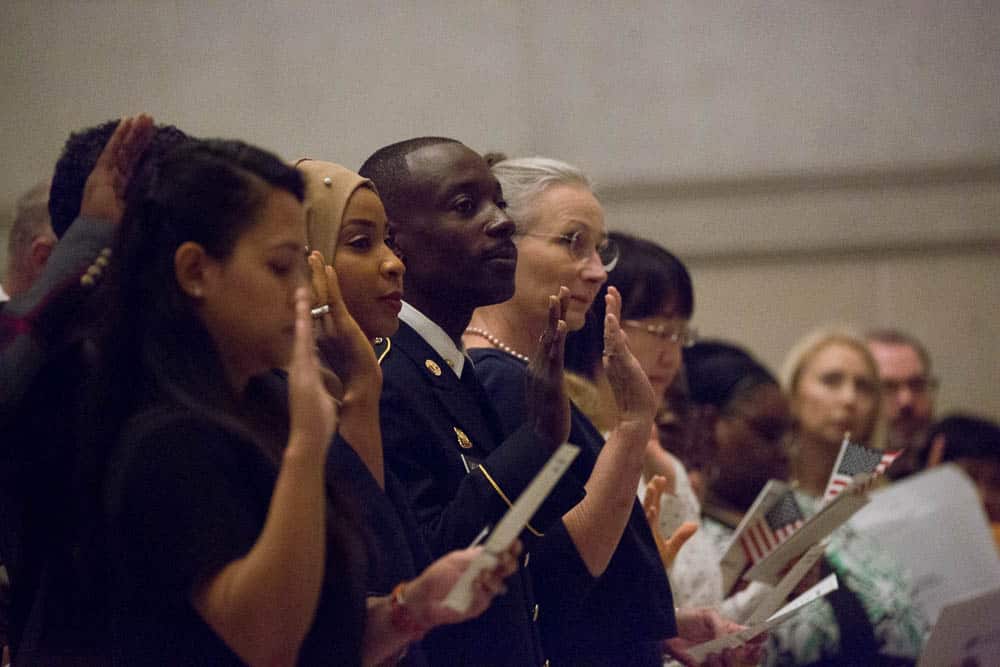
Obligations of Citizenship: Saving Democracy From Encroaching Authoritarianism
Citizenship should be important to anyone living in the United States enjoying its security and individual rights. What exactly is citizenship? It is the relationship of the individual to his or her state or nation to which that individual owes their allegiance in return for its protection. Citizenship is particularly important in a democracy such as the United States because a democracy is, by definition, a nation that derives its power from the people – its citizens.
With citizenship comes certain rights, duties, and responsibilities. In some cases, citizenship is fully extended to an individual, and in other cases its rights and privileges are limited. For example, when the U.S. Constitution was first adopted, slaves were not included as citizens, and states were given credit for representation in Congress and taxes for only 3/5th of a person for any slave counted.
Limited citizenship in the United States still exists today. In my years representing the interests of San Juan, Puerto Rico, in Washington, D.C., I had to deal with the fact that U.S. citizens residing on the island had a form of limited citizenship. Its commonwealth (territorial) status does not allow Puerto Ricans to vote for President nor get full representation in Congress nor benefit fully from federal programs. As a founder and executive director of the U.S. Council for Puerto Rico Statehood, I worked hard for the statehood movement that, if and when successful, would gain Puerto Rican’s full citizenship.
U.S. citizens are the benefactor of the Bill of Rights – the first ten amendments to the Constitution, including among them the rights of free speech, press, assembly, petition, religion, and others. These rights are enshrined in law and are often the subject of legal battles, particularly when one right conflicts with another and often end up at the Supreme Court to decide. Most related news and commentary dwell on these rights of citizenship.
What is not so often in the public’s eye are the obligations of citizenship – the responsibilities that come with the protections provided. These obligations, while crucial, are not set in law. It is because they are not fully appreciated and carried out effectively by U.S. citizens that we are struggling as a nation against “democratic backsliding.” They are indeed only obligations, not legal requirements, but are fundamental to protecting democracy.
In his timely new book, The Bill of Obligations: The Ten Habits of Good Citizens, Richard Haass, PhD, has outlined the crisis which is upon us – the possible loss of our democracy unless citizens take their duties and obligations of citizenship more seriously. Dr. Haas lists ten important obligations of citizens. They include the obligations to:
- Be Informed: Check the news from various reliable sources. Beware of disinformation.
- Get involved: Start with voting, volunteer at polls, and serve on civic committees.
- Stay open to compromise: Our political parties are becoming more extreme in rhetoric and positions. Compromise is not a weakness but is central to democracy.
- Remain civil: Avoid ad hominin arguments. Civility is not a weakness either. Think Supreme Court Justices Ginsberg and Scalia – a strong liberal and a strong conservative and close friends.
- Reject violence: No more January 6th’s. Protest yes. Violence no.
- Value norms: Think of unwritten traditions, rules, customs, which lubricates democracy.
- Promote the common good: Promote the well-being of others.
- Respect government service: Government employees are “us.” Voluntary service like the Peace Corps and AmeriCorps have immense value.
- Support the teaching of civics: Especially important starting in our primary and secondary schools. It’s now terribly lacking.
- Put country first: Before political party and person.
Perhaps there are more, but these are good places to start for all of us. If we do better, then U.S. citizens and citizens of many similar democracies abroad struggling in the same way will strengthen their democratic foundations and by doing so successfully fight off the encroachment of authoritarianism.
- About the Author
- Latest Posts
Thomas C. England, ME&A’s Chief for Strategy and Innovation, has more than 40 years of experience in policy and management positions in both the public and private sector with specific expertise in international development programs. He is one of ME&A’s co-founders and served as CEO and President, and as Chairman of the Board of Directors, for more than 30 years.



